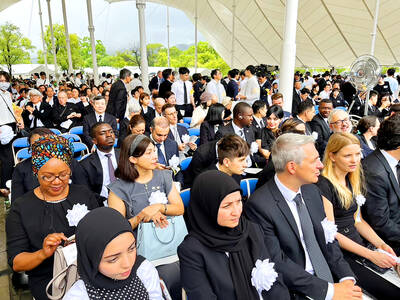Fans mourned and questions were asked yesterday after K-pop star and apparent revenge porn victim Goo Hara was found dead in a possible suicide, which would make her the second female singer in a month to take her own life in the high-pressure industry.
The body of Goo, a member of former girl group Kara, was discovered on Sunday evening at her home in Cheongdam, one of Seoul’s wealthiest neighborhoods.
Police were still investigating her cause of death and Yonhap news agency reported that they were “keeping the possibility of suicide in consideration.”

Photo: AFP
In May, the 28-year-old star apologized to her fans after being hospitalized following a suspected suicide attempt, saying she had been “in agony over a number of issues.”
Goo was abused by a former boyfriend last year who — after they split — blackmailed her over their sex videos.
The ex-boyfriend, hairdresser Choi Jong-bum, threatened “to end her entertainment career” by leaking the footage, and a CCTV clip of the couple showed the singer kneeling before him apparently begging him not to.
In the conservative South, women who appear in such videos often feel shame — despite being the victims — and face ostracism and social isolation if the images become public.
Choi was convicted of multiple crimes including blackmail in August and was given a suspended jail term, but the star had been targeted by abusive online comments since the incident.
Before her body was discovered her Instagram account was flooded with hate comments about her appearance and her history with Choi.
Goo made her debut in 2008 with Kara — for several years one of the two biggest K-pop girl groups — and pursued a solo career after the group broke up, completing a tour of Japan last week.
Her death sparked an online petition on the Web site of the South Korean presidential office calling for stronger punishments for cybercrimes and abusive online comments, which garnered more than 20,000 signatures in less than a day.
“It was not long ago that we lost someone through hate comments and this cannot happen again,” the petition said. “Please protect the people from hate comments and criticisms that are spreading like a virus.”
Goo’s last Instagram post on Saturday evening showed her in bed with the caption, “Good night.”
Her death comes a month after Sulli — a fellow K-pop star and her close friend — took her own life last month after a long struggle with online bullying.
South Korea has one of the world’s highest rates of suicide which, according to government figures, is among the top causes of death for those under 40.
Taboos about mental illness also dissuade many South Koreans from seeking help.
Fans mourned the star’s death and lamented that she was unable to hear the voices of support.
“The stars appear to have a shining presence, but they live with a pain that no one will understand,” a fan wrote on Goo’s Instagram account.
“How many more victims after Sulli and Goo will there have to be to understand that hate comments hurt others?” the writer added.
Another fan wrote: “Maybe you couldn’t hear the voices of love and support because the voices of hate were too loud. My heart aches.”

DEFENSE: The first set of three NASAMS that were previously purchased is expected to be delivered by the end of this year and deployed near the capital, sources said Taiwan plans to procure 28 more sets of M-142 High Mobility Artillery Rocket Systems (HIMARS), as well as nine additional sets of National Advanced Surface-to-Air Missile Systems (NASAMS), military sources said yesterday. Taiwan had previously purchased 29 HIMARS launchers from the US and received the first 11 last year. Once the planned purchases are completed and delivered, Taiwan would have 57 sets of HIMARS. The army has also increased the number of MGM-140 Army Tactical Missile Systems (ATACMS) purchased from 64 to 84, the sources added. Each HIMARS launch pod can carry six Guided Multiple Launch Rocket Systems, capable of

TRAJECTORY: The severe tropical storm is predicted to be closest to Taiwan on Wednesday and Thursday, and would influence the nation to varying degrees, a forecaster said The Central Weather Administration (CWA) yesterday said it would likely issue a sea warning for Tropical Storm Podul tomorrow morning and a land warning that evening at the earliest. CWA forecaster Lin Ting-yi (林定宜) said the severe tropical storm is predicted to be closest to Taiwan on Wednesday and Thursday. As of 2pm yesterday, the storm was moving west at 21kph and packing sustained winds of 108kph and gusts of up to 136.8kph, the CWA said. Lin said that the tropical storm was about 1,710km east of Oluanpi (鵝鑾鼻), Taiwan’s southernmost tip, with two possible trajectories over the next one

Tropical Storm Podul strengthened into a typhoon at 8pm yesterday, the Central Weather Administration (CWA) said, with a sea warning to be issued late last night or early this morning. As of 8pm, the typhoon was 1,020km east of Oluanpi (鵝鑾鼻), Taiwan’s southernmost tip, moving west at 23kph. The storm carried maximum sustained winds of 119kph and gusts reaching 155kph, the CWA said. Based on the tropical storm’s trajectory, a land warning could be issued any time from midday today, it added. CWA forecaster Chang Chun-yao (張竣堯) said Podul is a fast-moving storm that is forecast to bring its heaviest rainfall and strongest

CRITICISM: It is deeply regrettable that China, which is pursuing nuclear weapons, has suppressed Taiwan, which is pursuing peace, a government official said Representative to Japan Lee Yi-yang (李逸洋) yesterday accused Beijing of interference after Taiwan’s official delegation to the Nagasaki Peace Memorial Ceremony in Japan was assigned seating in the “international non-governmental organizations [NGO]” area. “Taiwan is by no means an international NGO, but a sovereign nation that is active on the international stage,” Lee said. Lee and Chen Ming-chun (陳銘俊), head of the Taipei Economic and Cultural Office (TECO) in Fukuoka, attended the ceremony in Nagasaki yesterday, which marked the 80th anniversary of the atomic bombing of the city. That followed Lee’s attendance at the Hiroshima Peace Memorial Ceremony on Wednesday